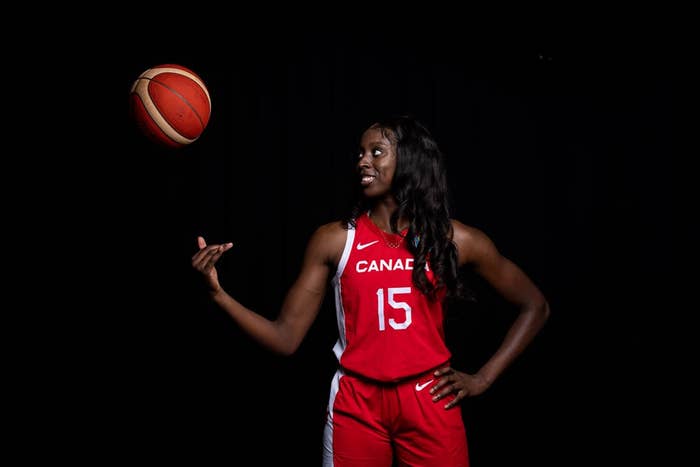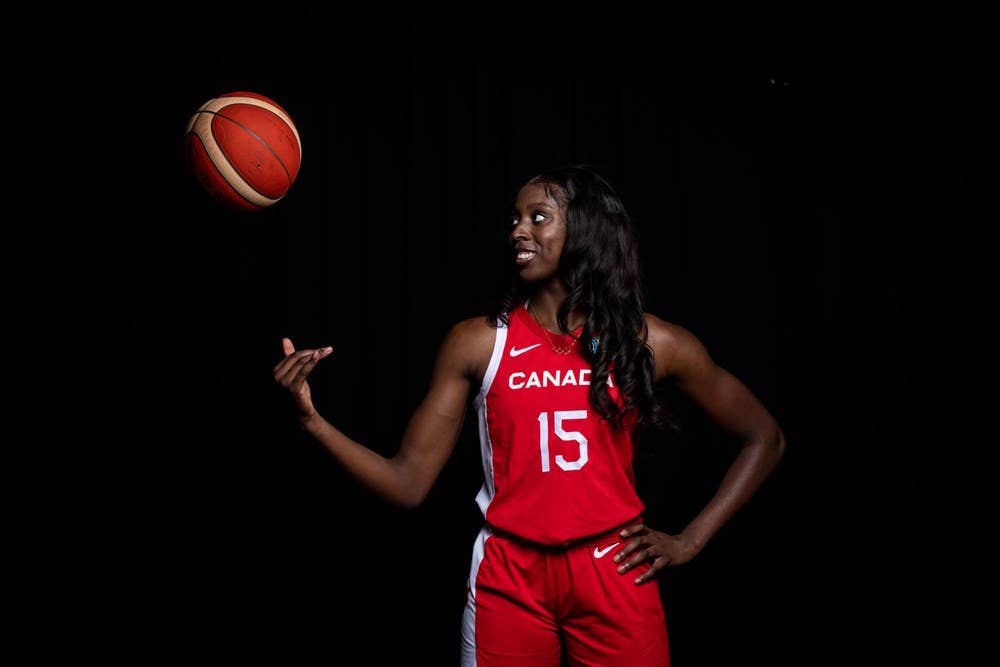
By now, you’ve probably heard about the dunk. In fact, you very well could’ve seen it. And if you have, you likely understand why Laeticia Amihere has come to be defined by the singular moment when she exploded off her left foot and threw down a massive right-handed dunk at age 15 to become the first Canadian woman to dunk in a game.
But Amihere is so much more than the dunk. Now 21 with an NCAA National Championship with the South Carolina Gamecocks, and gold and bronze medals in international competitions with Team Canada to her name, Amihere has had several defining moments since.
Unfortunately, as it so often happens in sports — and even more so with female athletes — Amihere has been put in a box, labelled as “the girl who can dunk” rather than what she really is: a one-of-a-kind person who can do a little bit of everything, on and off the court. In fact, what makes Amihere so special is that she will never fit in a box, constantly shapeshifting to her teammates and community’s needs.
The 6-foot-4, Mississauga, Ontario, native is an athletic rim-running, shot-blocking, play-making, pull-up shooting, post-up operating matchup nightmare for opposing teams. She’s big, fast and heady enough to shift from the post to the point guard in the National Championship game in order to burst a zone, or from the court to her community in the offseason, where she uplifts the next generation of Canadian girls by being a role model and hosting camps with her non-profit, Back to the Motherland.
It’s no wonder Amihere’s two favourite basketball players are Kevin Durant and Candace Parker: position-less anomalies with forward-sized bodies and guard-like skills — athletes who changed the NBA and WNBA with their unprecedented styles of play. Amihere is the same way.
Pegged as the future of women’s hoops since she was in her early teens, Amihere has the opportunity to turn the future into the present by breaking through on the international stage as she represents Team Canada’s Senior Women’s National Team at the upcoming FIBA Women’s Basketball World Cup, which begins on Sept. 21 in Sydney, Australia.
The timing couldn’t be better, either, as Amihere is set to enter her senior season at South Carolina later this fall and will be eligible for the 2023 WNBA Draft, where she is projected to become the first Canadian selected since Team Canada teammate Bridget Carleton in 2019. Instead of preparing for her final college season with the Gamecocks, Amihere is in Australia to try to help the senior team win its first medal in international competition since 1986.
“I owe my development to Team Canada and Team Ontario, just the eliteness that they bring,” Amihere says. “When you talk about Team Canada you talk about nutrition, you talk about basketball IQ. So I think that’s kind of what separates us from other countries: We put it all into our athletes. They really make sure that we’re well-rounded, ready for the next level.”
Amihere debuted with Team Ontario in 2015 at the U15 National Championship, leading them to a gold medal and winning tournament MVP as a 13-year-old. Then, Amihere began playing with the Canadian national team, always as one of the youngest players on the roster, winning gold at the U16 FIBA Americas that same year and bronze at the U19 FIBA World Cup in 2017, where she was named to the All-Star Five.
Plus, Canada Basketball was instrumental in the formation of the Ontario Scholastic Basketball Association (OSBA), a league that Amihere was the inaugural MVP of in 2017 with Kings Christian College and one that she considers instrumental to her development, allowing her to regularly play against high-level competition and fundamentally changing the way she trained.
“I used to travel from Mississauga to Toronto, you know, finish school at 2:30 pm and have to be in Toronto by 4:00 pm for weights and then I had to drive to Scarborough to do basketball training after that. It was just a lot,” Amihere, who basically lived out of her car for a period of time before the league’s formation, said. “So the OSBA provided a program where I was able to do my schooling, my basketball, my weight training, all that in one area. So that level of eliteness definitely brought me to another level.”
After an illustrious high school career was cut short due to season-ending injuries in her junior and senior seasons, Amihere joined the Gamecocks as the No. 10 overall recruit and the No. 2 forward in the 2019 class. Last season, she averaged 6.3 points, 3.6 rebounds, 1.2 assists and 1.4 STOCKS (steals + blocks) in just 16.6 minutes per game en route to the championship, an accomplishment Amihere never could have imagined when she was young.
Growing up in Mississauga, Amihere’s family didn’t have enough money to enroll her in rep or AAU basketball, nor did she have the role models to lay out a pathway that she could follow. But as luck would have it, one day during a house league match Kenny Manning, who ran the girls rep program the Mississauga Monarchs, came to watch Amihere play at the suggestion of a colleague. She was in just fifth grade playing against high schoolers, and he couldn’t believe his eyes.
“She just kept doing the same move over and over, and went around everybody, scoring about 30-40 points. I was blown away,” Manning says, later taking her under his wing and enrolling her with his Grade 6 rep team. “From there, she became a sponge… If I showed her something, the next week she came back with it mastered. So she’s always been a hard worker from day one.”
What stood out to Manning, who coached Amihere for three years and who says “has the potential to be the best player to ever come out of Canada,” was that “it” factor: More than her work ethic, speed, positional versatility or anything he could quantify, it was her charismatic personality and ability to lead teammates that were almost always older than her that made her so special.
“Her inherent ability was to motivate her teammates. She would tell other girls, ‘listen, I’m going to drive here. You’re gonna shoot there. You continue to shoot from that spot. I don’t care if you miss. I’ll give it back to you again,” Manning says. “So that first year she played, her teammates weren’t very skilled, none of them were at the time. But they got better during the season because she pushed herself so much, she pushed her teammates so much. She always encouraged them.”
“I wasn’t as much of a players’ coach back then as I am now, so she always would pick up a player if they were struggling with something, she would pick them up and give them motivation,” Manning adds, suggesting that Amihere was likely responsible for helping many of her teammates receive basketball scholarships. “I remember she would sit there with a girl named Jennifer who’s shot was off. Amihere would let Jennifer shoot and just rebound for her… she has always had that spirit of giving, that spirit of enabling her teammates to do the best they could.”
Just like how Manning relied upon Amihere to lead from an early age, Team Canada is doing the same. Despite her youth, Amihere is one of the longest-tenured and most experienced players on the World Cup roster, playing with the senior team since 2017, appearing in a total of 18 games, including all three at the Tokyo Olympics last summer. After seeing program veterans like Miranda Ayim, Nayo Raincock-Ekunwe, and Kim Gaucher retire from the team following the Tokyo Olympics, incoming head coach Victor Lapena has brought a younger group to the World Cup in hopes of developing a team over the long-haul, with aims of peaking at the 2024 Paris Games. Still, there are hopes to medal in Sydney, especially with the team entering the tournament with an all-time high ranking of fourth in the world.
“I think playing on the biggest stage is just kind of a testament to all the hard work we put in throughout the years and the progress that Canada Basketball is making,” Amihere says about the upcoming World Cup. “So to be able to be on that big stage is kind of putting our name out there, showing that we’re making strides and we’re trying to compete with the top countries in the world and we’re trying to medal and be on the podium. These tournaments are very important to me.”
“It’s a hard decision to leave my college team during the season, but it’s kind of a testament to how much pride I have for my country. And how much pride I have for the development and the advancement of Canada Basketball.”
Amihere represents a bridge between the youth and the veterans on Team Canada. Not only will she be relied upon to play a bigger role than she has in the past on the court, but she is also being relied upon to acclimate some of the younger players to the senior team. That process began a few months ago at the start of the summer when Amihere joined the Under-23 team at GLOBL JAM, where she took on more of a coaching role after an injury forced her to sit on the sidelines, sharing her experiences with her younger teammates.
“This is the next generation of talent. There are a bunch of people that are going to be here with us in the next phase going to Australia [for the World Cup]. So I think it’s important for them to be acclimated to the system,” Amihere told me at the time.
“Laeticia has been an impact player throughout our age group teams… having proven she can perform on some of the biggest stages against the world’s best,” Team Canada assistant coach Carly Clarke said. “Following some retirements after the Olympics, and her gaining some Olympic experience, we will continue to lean on her more as an important part of our team.”
That’s a lot to ask from a 21-year-old college student who is yet to play a professional basketball game. But at the same time, the Canadians are simply asking Amihere to be herself. After all, Amihere has played with older women her entire life and was never afraid to lead then. What does it matter if those players are now WNBA stars like Kia Nurse and Nathalie Achonwa?
On the court, Amihere’s athleticism and versatility is going to be key when it comes to merging the playstyles between the youth and the veterans, and her unique skill set could potentially unlock a new version of Team Canada in the years to come.
“This newer generation is learning basketball in a different way. And I think the goal and the hope is that we can almost blend the two generations,” Team Canada captain Nathalie Achonwa says. “You have us veterans that are coming from a place of experience and really knowing the game and knowing the fine details of the game. And when you meet this new generation of athletic, fearless women that are coming up — I always laugh and think about the clips of Laeticia dunking and I’m like, ‘Whoa, I wish I could do that!’”
“But kind of blending those two styles and hoping that you’re creating almost like this super generation of both knowledgeable and athletic players — I think that will continue to take our game to new heights.”
After all, what is a bridge if not a way of taking people to places they’ve never been before?



